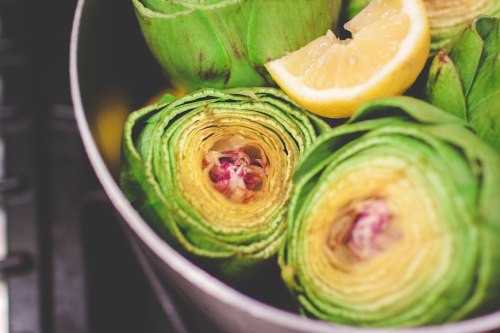Polyphenols can help boost your heart, brain, *and* digestion—here’s how to get your fill
Find out why polyphenols are so beneficial to the body and see 10 top sources of foods rich in polyphenols so you can get your fix.

Regardless of what healthy eating plan you stick to, there’s one rule that’s prescribed to all eaters: Eat a lot of plants. If it comes from the ground, chances are it’s good for you. (Okay, except for those mushrooms that will kill you and herbs that are drugs—but even that latter one is hotly debated.) But in general, fruits, vegetables, and herbs have myriad health benefits. One biggie: polyphenols.
“Polyphenols are active compounds that are naturally found in fruits, vegetables, cereals, and some beverages—like wine, coffee, and tea,” says naturopathic and holistic dietitian Meg Hagar, MS, RD. “They benefit the body by fighting against harmful agents like ultraviolet rays, radiation, and some pathogens. Research has shown that diets high in polyphenol-rich foods can even help prevent the development of illness such as cancers, heart diseases, and diabetes.” The ultimate multitasking overachievers, research has also found polyphenols to benefit the body by boosting health in a range of areas including cognitive functioning, cardiovascular strength, and digestion.
According to scientific research, a good goal is to aim to get 650 milligrams of polyphenols a day, though Hagar says the science is a bit fuzzy on this because it’s difficult to measure how well the nutrients are absorbed. “Eating polyphenols will be beneficial no matter what, so get them in whenever and however you can,” she says. “However, since we know they help fight damage, it might be a good idea to be more conscious of consuming these components post-workout, during a day in the sun, or when you have been exposed to environmental pollutants.”
Scientists are starting to investigate polyphenols as a way to slow outward signs of aging too, making it a buzzy nutrient in the beauty industry. “The research supporting polyphenol consumption and anti-aging is fascinating,” Hagar says. “Especially working with a lot of skin clients, I always promote consuming fruits and vegetables for this reason. And it’s also why I’m a fan of moderate tea, coffee, and wine intake.” (All—spoiler alert—top sources of polyphenols, as you’ll soon see.)
Hagar says a good rule is to get four or five servings of fruits or vegetables a day, not just to reap those polyphenols rewards, but to get the other nutrients you need, too. “This should be more than enough to get the beneficial effects of a high-polyphenol diet,” she says.
Ready to start working more polyphenols into your diet? Keep reading for 10 foods and drinks that will help you do it.

10 foods rich in polyphenols
All amounts below are per serving, according to the European Journal of Clinical Nutrition.
1. Cherries (274 mg per serving): Cherry on top puns aside, this fruit really brings it on the polyphenols front as one of the highest sources. Scientific studies have linked cherries in particular as being good for your gut, too.
2. Strawberries (235 mg): Just a handful of these juicy berries gets you one-third of the way to the daily goal. One study showed that polyphenols from strawberries can contribute to preventing and treating chronic-degenerative diseases and lower chronic inflammation. (The antioxidants play a big role in that, too.) Just be sure to buy organic since strawberries are the dirtiest of the Dirty Dozen.
3. Red grapes (101-169 mg): Best news ever: This also includes red wine. (You know how you’ve heard that red wine is good for your heart? This is why.) The key—whether you’re going for the fruit in its food form, juice, or wine—is to go for red grapes since the polyphenols are found in their skins. (Green grapes have 10 mg of polyphenols per serving.)
4. Artichokes (260 mg): More into veggies than fruits? Artichokes are a top source of polyphenols. In one study, scientists even used them as a key component in helping treat breast cancer.
5. Red onion (168 mg): Similarly with red grapes, the key here is to go for red onions over yellow ones. You’ll also get more of the benefits if you eat it raw.
6. Spinach (119 mg): Not an artichoke fan? Spinach has a decent amount of polyphenols, too. You’ll also be getting a good amount of fiber, iron, calcium, and vitamin C by adding the green to your plate.
7. Hazelnuts (495 mg): All nuts have polyphenols, but hazelnuts have the most. As for other nuts, pecans have 493 mg of polyphenols and almonds have 187 mg. Your nut milk habit is doing you more good than you thought.
8. Dark chocolate (1664 mg): Your dessert is totally working in your favor—as long as you stay on the dark side and don’t have it every night.
9. Coffee (214 mg): That’s right—your morning cup is full of polyphenols. If you want to get the absolute most, go for a cherry roast.
10. Black tea (102 mg): If you’re a tea drinker, go black; it has a higher polyphenol amount than other varieties, such as white or green.
Looking at this list alone, it’s clear that it isn’t too difficult to meet the daily requirement for the nutrient—especially considering that the sources are delicious. Red wine? Chocolate? Hazelnuts? Done.
While you’re brewing yourself a cup of hot black tea, check out how it’s good for your gut. And here’s how to give it a ketogenic twist.
Sign Up for Our Daily Newsletter
Get all the latest in wellness, trends, food, fitness, beauty, and more delivered right to your inbox.
Got it, you've been added to our email list.










